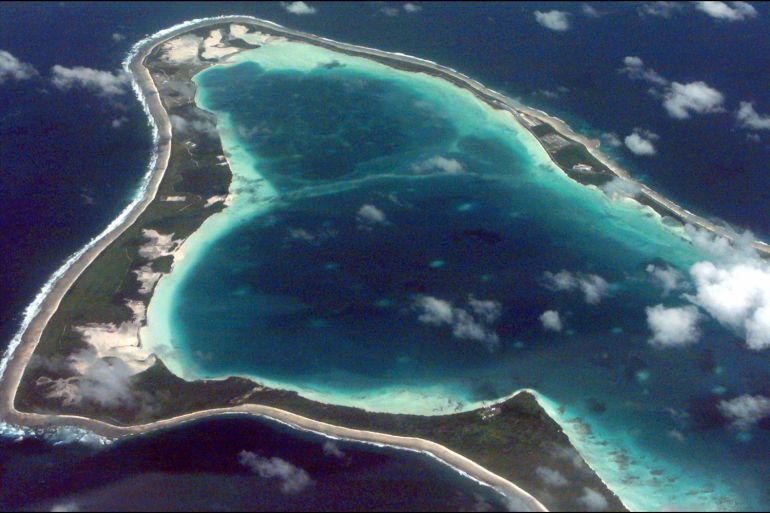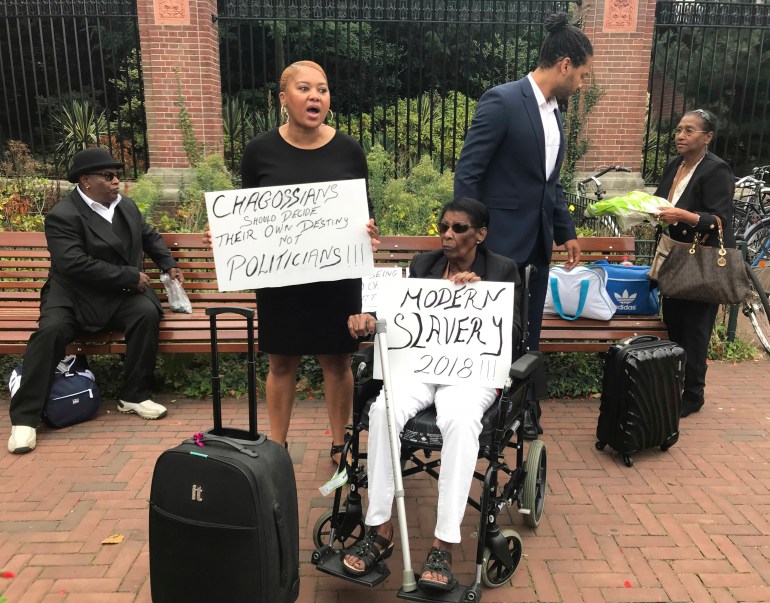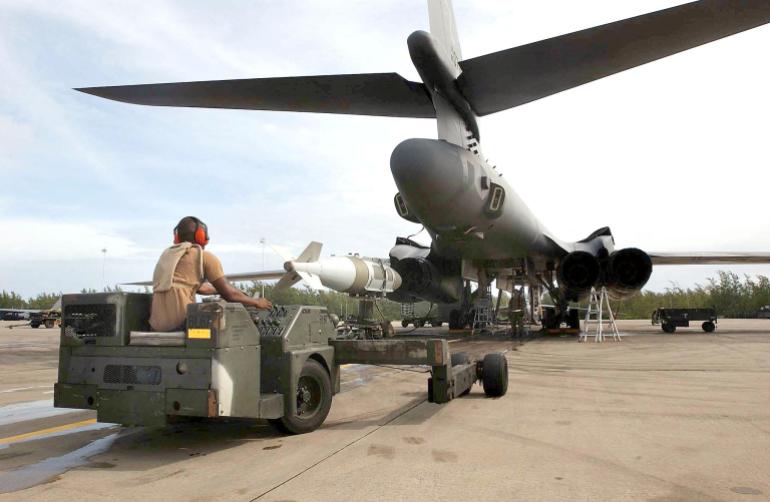Asylum seekers stuck on Diego Garcia start hunger strike
Group of Tamils has been held on the island, the site of a secretive US military base, since October last year.

Dozens of Tamil asylum-seekers have launched a hunger strike after eight months stranded on a secretive military base in the Indian Ocean, demanding that the government of the United Kingdom allow them to claim asylum in a safe third country.
“My husband contacted me today and informed me that seven people, including sick people, are now engaged in a hunger strike,” Meera*, the wife of one asylum seeker, told Al Jazeera on May 18. “They want an answer as to when they will be taken elsewhere.”
Keep reading
list of 4 itemsWhy Sri Lankan Tamil refugees in India attempted mass suicide
How an Afghan refugee crisis at sea transformed Australia policy
Refugee diaries: 10 years in immigration detention in Australia
By the next morning, the number of asylum seekers on hunger strike had risen to 42, according to their lawyers.
Meera’s husband is one of 89 Sri Lankan Tamils, including 20 children, who set out from southern India in a fishing boat in late September 2021 in the hopes of claiming asylum in Canada. Most of the group had fled to India years earlier to escape political persecution and the threat of torture and enforced disappearance during the Sri Lankan government’s bloody 26-year civil war against Tamil separatists, which ended in 2009.
But 11 days and more than 2,000km(1,243 miles) into their journey, the asylum seekers’ boat began to founder and was intercepted by UK forces, who escorted the group to Diego Garcia, part of the British Indian Ocean Territory. The island is home to a joint US-UK air and naval base, and the asylum seekers have been held there since October 3 last year with no indication of how long they will remain there, or where they will be sent next.
Most of the group are seeking guarantees from the UK government that they will not be repatriated to Sri Lanka, which has suffered an economic and political collapse in recent weeks, nor to India, where at least 60 of them are registered as refugees and would be forced to return to squalid camps.
“They are living in a confined compound on the island, where their lives and their children’s futures are in limbo,” Meera said.

The London-based law firm Leigh Day, which represents 81 of the 89 asylum seekers, is now demanding that the UK government explain when and how it plans to enable the group to claim international protection in accordance with their rights under the Refugee Convention and customary international law.
“The mental state of many of our clients can best be described as utterly despairing,” the law firm said in a letter due to the UK government on May 19.
“They have asked us what the UK government will do in the event of their deaths on the island, and some have requested that if they die their organs should be donated to the British people.
“It is clear that our clients are at imminent risk of serious harm.”
Incommunicado
For the first six weeks after they were towed to Diego Garcia in their damaged boat, the asylum seekers had no contact with the outside world. It was only in mid-November 2021 that Meera and other relatives in Sri Lanka and India received brief phone calls from unknown numbers and learned that their loved ones were still alive.
For most of the ensuing six months, each asylum seeker had access to a landline for 30 minutes every nine or 10 days, allowing them to make outgoing calls but not receive incoming ones.
Asylum seeker Jegan* told Al Jazeera in a statement conveyed through the group’s lawyers that he worried his parents back home would “sacrifice themselves or harm themselves” during the weeks he was kept incommunicado.
Another asylum seeker on the island later required medical attention after refusing to eat for four days because he was not able to see his newborn child via video call.
Lawyers at Leigh Day are preparing to file for judicial review against the UK government if the group does not receive “regular, private and unmonitored access” to video calls, email and internet access. In a pre-action protocol letter sent to the UK government in late April, the law firm warned that restricting the group’s access to communications is “in breach of well-established common law rights of access to legal representatives for persons deprived of their liberty.
“Our clients are in a worse position than if they were prisoners,” the letter said, because throughout most of their time on the island, they were denied “access to communications which would enable them to challenge the basis of their imprisonment”.
On May 13, a UK government spokesperson told Al Jazeera that the group had been given unlimited access to telephone communications.
However, contacting the group from outside Diego Garcia remains difficult and can take weeks to arrange, despite the fact that a church about 200 metres from the asylum seekers’ encampment is equipped with WiFi. The group has not been allowed to visit the church without an escort, and once escorted, have only been able to use UK officials’ personal devices.
“There is no internet or WiFi [where we are staying], so we can’t use our own phones,” Jegan said. “Some people just sit on their own thinking about their families.”
Tempers rising
Members of the group say boredom and a lack of information about their futures is causing their mental health to deteriorate.
“Imagine having all these people cooped up with nothing to do – they just think about what is going to happen, and tempers are rising,” Janaki*, an asylum seeker, told Al Jazeera.
According to Leigh Day’s pre-action protocol letter, “no further steps have been taken to provide proper education” for the 20 children on the island beyond providing them with DVDs and basic English lessons.
“I feel distraught when the kids say: ‘How long will we stay here? When can we leave?’ It is stressful for them, and it breaks my heart. We feel like we can die in the ocean here. The kids seem to be losing their minds,” Janaki said.
Moreover, some of the asylum seekers’ medical needs have exceeded the resources available on the island, which has had no permanent population since the UK forcibly deported the native Chagossians in the 1960s and 70s to fulfil an agreement to build a military base for the United States.
Earlier this year, several asylum seekers were flown from Diego Garcia to Bahrain for various medical treatments before being brought back to the island.
“I wonder how much it cost the UK government to fly refugees from Diego Garcia to Bahrain for private medical treatment,” said Chris Eades, secretary-general of the Asia Pacific Refugee Rights Network. “What happens if any of the group falls suddenly ill? It would be far more humane for the UK government to move the group to the UK, where they can promptly access the NHS.”

Eades added that bringing the refugees to the UK would also allow the 20 children in the group to go to school.
“Being held for many months on a military base with little contact with the outside world, inadequate healthcare, and with no end in sight is utterly unacceptable and a violation of the Refugee Convention,” he said.
More arrivals
Further straining resources on the island was the apparently coincidental arrival on April 10 of a further 30 asylum seekers who were rescued from a second vessel and brought by UK forces to the tented encampment on Diego Garcia to join the original 89.
“After the new group landed, the food has been very bad,” said Jegan. “The food size has been cut down, and the original group of us are thinking that if more people come, [the UK authorities] will start sending everyone back to [Sri Lanka or India], because more people are coming. We think that because of the new arrivals, the authorities have stopped all their work to send [us] to another place.”
A UK government spokesperson disputed this, saying: “We are supporting 119 people who were escorted to the British Indian Ocean Territory in damaged fishing vessels in the past year.
“We are working urgently with the group and our international partners on options and next steps, with their welfare being our top priority,” the spokesperson told Al Jazeera.
The United Nations High Commissioner for Refugees, for its part, has been urging the UK government, which controls Diego Garcia as an Overseas Territory, to consider the claims of these 119 asylum seekers “in accordance with its obligations under International Law”.
“We stand ready to provide technical assistance to find appropriate solutions, understanding that a number within the group may have international protection needs,” a spokesperson for the agency said. “The negative impact of prolonged uncertainty and limbo on refugees’ and asylum seekers’ mental health is well-documented around the world.”
“I am worried that nine months will turn into nine years,” said Janaki, echoing the experience of an earlier group of asylum seekers who ended up trapped on a UK military base in Cyprus for 20 years before being allowed to claim asylum in the UK in 2018.
“I wonder if a good future will ever happen. I have been a refugee for over 30 years of my life. Will we ever get out of here?”
*Names of asylum-seekers and their relatives have been changed for fear of reprisals.